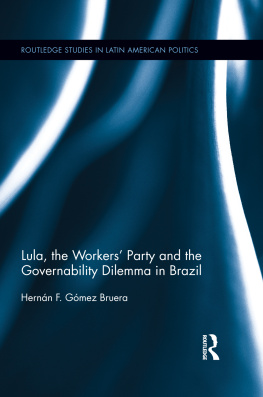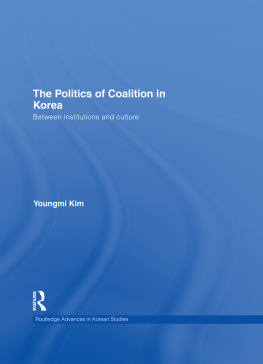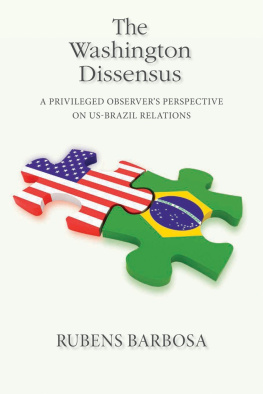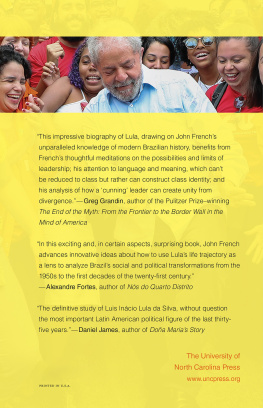Hernn Gmez Bruera looks inside the PT and its social networks to understand how state power has transformed the partys reform agenda. His book provides a unique and highly insightful account of the ways in which parties with origins in social movements adapt toand are transformed bythe exercise of political power in formal governing institutions.
Kenneth M. Roberts, Cornell University
Gmez Bruera provides a very smart, comprehensive, and nuanced account of the PTs rise to power and how it has been transformed by power. Poised between its roots in Brazils social movements and the imperatives of governing in a fragmented polity, the PTs trajectory is a fascinating and revealing case study in the possibilities and limits of transformative politics.
Patrick Heller, Brown University
Lula, the Workers Party and the Governability Dilemma in Brazil
While scholars, activists and pundits from around the world have heralded the Lula years as a breakthrough for poverty reduction and the forthcoming emergence of Brazil as a dynamic economic superpower, many of their counterparts in the country as well as a number of Brazilianists elsewhere have expressed great disappointment.
Tracing back the trajectory of Brazilian Workers Party (Partido dos TrabalhadoresPT), Hernn F. Gmez Bruera explores how holding national executive public office contributed decisively to a pragmatic shift away from the partys radical redistributive and participatory platform, earning the approbation of international audiences and criticisms of domestic progressives. The author explains why a unique party, which originally promoted a radical progressive agenda of socio-economic redistribution and participatory democracy, eventually adopted an orthodox economic policy, formed legislative alliances with conservative parties, altered its relationship with social movements and relegated the participatory agenda to the sidelines.
Touching on multiple dimensions, from economic policy and land reform to social policy, this book offers a distinct explanation as to why progressive parties of mass-based origin shift to the center over time and alter their relationships with their allies in civil society. Written in a clear and accessible style and featuring an enormous wealth of firsthand accounts from party leaders at all levels and within different factions, Gmez Bruera offers much needed new insights into why progressive parties alter their discourses and strategies when they occupy executive public office.
Hernn F. Gmez Bruera has a PhD from the Institute of Development Studies, at the University of Sussex, with an academic interest on Latin American and Brazilian politics, progressive parties, participatory democracy and social movements. His first two books are Desde el Sur (Altamira, Buenos Aires) and Conversaciones sobre el Hambre: Brasil y el derecho a la alimentacin (CEDRSSA, Mxico). He has worked as a consultant for international organizations, as a political analyst and as a freelance journalist.
Routledge Studies in Latin American Politics
1 Research and International Trade Policy Negotiations
Knowledge and Power in Latin America
Edited by Mercedes Botto
2 The United Nations in Latin America
Aiding Development
Francis Adams
3 Fear and Crime in Latin America
Redefining State-Society Relations
Luca Dammert
4 Populism in Venezuela
Ryan K. Brading
5 Civil Society and Participatory Governance
Municipal Councils and Social Housing Programs in Brazil
Maureen M. Donaghy
6 Representation and Effectiveness in Latin American Democracies
Congress, Judiciary and Civil Society
Edited by Moira B. MacKinnon and Ludovico Feoli
7 Lula, the Workers Party and the Governability Dilemma in Brazil
Hernn F. Gmez Bruera
Lula, the Workers Party and the Governability Dilemma in Brazil
Hernn F. Gmez Bruera
First published 2013
by Routledge
711 Third Avenue, New York, NY 10017
Simultaneously published in the UK
by Routledge
2 Park Square, Milton Park, Abingdon, Oxon OX14 4RN
Routledge is an imprint of the Taylor & Francis Group,
an informa business
2013 Taylor & Francis
The right of Hernn F. Gmez Bruera to be identified as author of this work has been asserted by him in accordance with sections 77 and 78 of the Copyright, Designs and Patents Act 1988.
All rights reserved. No part of this book may be reprinted or reproduced or utilised in any form or by any electronic, mechanical, or other means, now known or hereafter invented, including photocopying and recording, or in any information storage or retrieval system, without permission in writing from the publishers.
Trademark Notice : Product or corporate names may be trademarks or registered trademarks, and are used only for identification and explanation without intent to infringe.
Library of Congress Cataloging-in-Publication Data
Gmez Bruera, Hernn F.
Lula, the workers party and the governability dilemma in Brazil / Hernn F. Gmez Bruera.
pages cm. (Routledge studies in Latin American politics)
1. BrazilPolitics and government. 2. Lula, 1945 3. Partido dos Trabalhadores (Brazil) 4. BrazilEconomic conditions. 5. BrazilSocial conditions. 6. BrazilForeign relations. I. Title.
F2538.3.G67 2013
981dc23
2012046635
ISBN: 978-0-415-83432-2 (hbk)
ISBN: 978-0-203-49398-4 (ebk)
Typeset in Sabon
by Apex CoVantage, LLC
We have to keep in mind that the only way to get into office and achieve the structural reforms we want is by having a minimum base in the popular movement. If we win the elections and forget the movement by thinking that only our [political] alliances will allow us to make reforms, we might be able to rule for four years, but we will not be able to carry out those reforms that gave us important victories in some cities.
Luiz Incio Lula da Silva during a meeting with party
and social leaders in 1995.
In 2002, what was the meaning of governability for us? Governability meant having a majority in Congress, maintaining our social and historical base of support and broadening it towards other sectors, particularly the business sector, while also making sure that the economic crisis would not deepen. If the economic crisis had deepened, Lula would not have lasted even one year in power.
Authors interview with Jos Dirceu, Minister for the
Civil House of the Presidency, January 2009.
Contents
PART I
Before The Lula Administration
PART II
The Lula Years
I first travelled to Brazil in November 2002, shortly after Lula won the second round of the presidential election, and I went back several times between 2003 and 2004, while I was working for the Food and Agriculture Organisation of the United Nations. As part of my work I had the opportunity to interview a number of social leaders and government officials and to witness some of the attempts of the new government to bring innovations in the social policy arena. It was a time of great hope and expectation in which I developed an interest on both the Workers Party, whose electoral triumph had great impact on the Left in Latin America, and on civil society in Brazil, which was expected to play a key role in one of Lulas most important policies at the timethe Zero Hunger programme.










